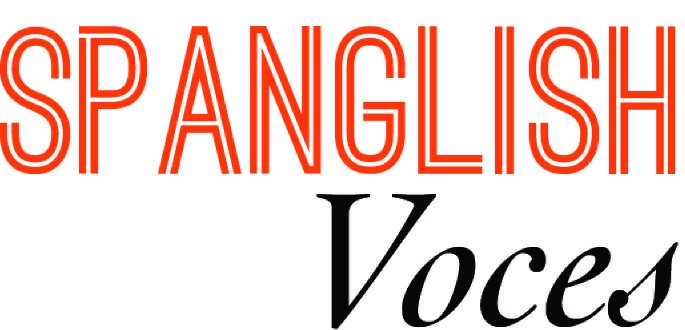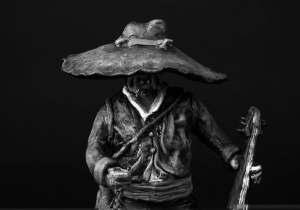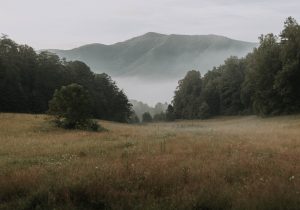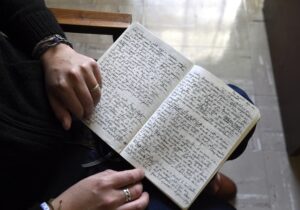for R.E.C.
You’re seventeen years old and you’re having a bad day. Well, it’s actually another bad day, in a string of rotten months, in what is turning out to be a terrible year. But you don’t want to talk about it. You never want to talk about it. Not anymore, at least.
Your mother doesn’t take long to notice. She motions for you to sit and scoops out some uncooked pinto beans from the reserve she keeps in a white plastic tub with red handles, the same one from your childhood that once contained a gallon of Neapolitan ice cream. The plastic is still stained pink and chocolate brown.
She announces that she’s going to make bean soup and pours the hard frijoles onto the kitchen table. Some scuttle across the chipped wood, others lodge themselves in the webbed and yellowed doily. She then grabs one of the cast-iron pots that she keeps beneath the sink, next to all the knotted up plastic Walmart bags, brand new pink sponges, and half-empty bottles of cleaning liquid. (Twenty years later, when you have your own mortgage and a little girl and a husband, the area under your kitchen sink will be almost identical.) After rinsing and dabbing the pot with a paper towel, she sits down across from you.
She puts on her glasses—the pair she’d reluctantly bought after several fights with your father; aún no soy vieja, she’d complained—and lets them rest on the tip of her nose. And though the process is something familiar to you, your mother explains it anyway.
Before you cook them, you have to examine the beans, she says to you in Spanish. Pick out the pebbles and any beans you can’t eat. Take only what is useful.
She grabs a handful of the uncooked beans and places them in front of her. You watch silently as she uses her ring finger to separate one from the rest. She examines it for a moment before she places it in the pot. She does the same with three or four beans, and turns to the rest of the pile. They each clang in the pot when she deposits them.
Your mother picks up speed as she works. In fact, she’s been practicing all her life, ever since she was a little girl in El Salvador. She sees a jagged, rust-colored pebble and separates it from the rest of the beans, continuing for a moment before speaking again.
No rush, your mother says in English. She pauses to remove another pebble. This one is bigger than the rest she’s pulled out so far. She switches back to Spanish. Otherwise, you might lose a tooth.
Though you know the story about how your abuelo, the one you’ve never met, lost his right molar—one day, one of your tías in San Salvador made bean soup without checking the beans first and, while eating it, your grandfather suddenly stood up from the table, clutched his jaw, and spit a bloodied pebble onto the kitchen floor along with part of his tooth—your mother tells it again anyway. Right then, at seventeen, you couldn’t possibly know that in less than ten years he would be dead, his funeral in a hot and crowded church becoming the first and the last time you would ever physically see him. But you feel something shift inside of you all the same.
Your grandfather’s memory will forever be tied to a dental deformity. Similar to when he suddenly cracked his tooth—or so you imagine—the feeling catches you off guard.
You listen quietly and grab a small pile of beans. You start sorting through them as well. Out of the twelve beans you’ve picked up, nine are fine, which you deposit into the pot, but three are discolored, almost rotten. You hold them tenderly in your palm and inspect them in the fading light of the weak December sun. What happened to these? you wonder silently. Where there should be dark brown speckles, there are what look like burn marks instead; one has a hole the size your pinky nail. You cast them aside.
No rocks, your mother says. She has been watching you. Not perfect, but still good. She motions for you to put them in the pot.
You grab another handful. Another twelve. There are two rocks this time, and nearly four of the beans are inedible. You pick out the rocks and the misshapen beans and toss them in the pile with the rejected ones. You hear your older brother’s hatchback pull up in the driveway. After getting fired from yet another job, he is living at home again. He’s twenty one, four years older than you. In two years, he will be locked up in the county jail for robbery, and though you know it wasn’t entirely his fault, that he was so fucked up on meth that he couldn’t tell his right foot from his left, much less right from wrong, he will stare at you and your mother from behind the plate-glass shield, telephone cradled against his ear, and say nothing when she asks him to explain himself. He will just stare down at his orange jumpsuit, tracing the seams with his free hand, not making eye contact once. Your father will disown him and refuse to speak to his namesake for years after he’s released from jail. So deep will be the shame. But your father will eventually come around, after your brother gives him his first grandchild.
You will swear to yourself and to your parents that you will never touch drugs, that you will never take a single puff of weed or feel your nostrils burn in anticipation of that high. You will, of course, not keep this promise, and a year after your brother is locked up, you will find yourself trudging up his old dealer’s stairs in Pico-Union to get your next fix. You will fall for a junkie then, some white boy a decade older than you. He will call you beautiful and you will believe him and he will kiss you between hits of ice, blowing clouds into your mouth, crystallizing your fantasies of a life with him. All of which will break all too easily. The time you spend together will be a rite of passage. You will learn by being cast into the fire and learning how to crawl out one step at a time.
But right now, you’re still seventeen and you’re sitting in your mother’s kitchen. Right now, it’s just bean soup and those punk asses calling you a faggot that have you all worked up. You and your mother work in silence, each of you taking a handful of beans and separating what is useful from what must be discarded—what will nourish you from what will only destroy you. You’re on the brink of adulthood, learning that some days and years will be better than others—that some disrupt the flow of time and remain lodged forever in your memory, while others will allow time to pass, peacefully, on its mad rush to oblivion.
 C. Adán Cabrera is a Salvadoran-American writer, translator, and editor based in Barcelona. Among other publication credits, Carlos’s writing has appeared in Carve Magazine, The Acentos Review, BorderSenses, parentheses, and Kweli Journal. Follow him: cadancabrera, @cadancabrera.
C. Adán Cabrera is a Salvadoran-American writer, translator, and editor based in Barcelona. Among other publication credits, Carlos’s writing has appeared in Carve Magazine, The Acentos Review, BorderSenses, parentheses, and Kweli Journal. Follow him: cadancabrera, @cadancabrera.





